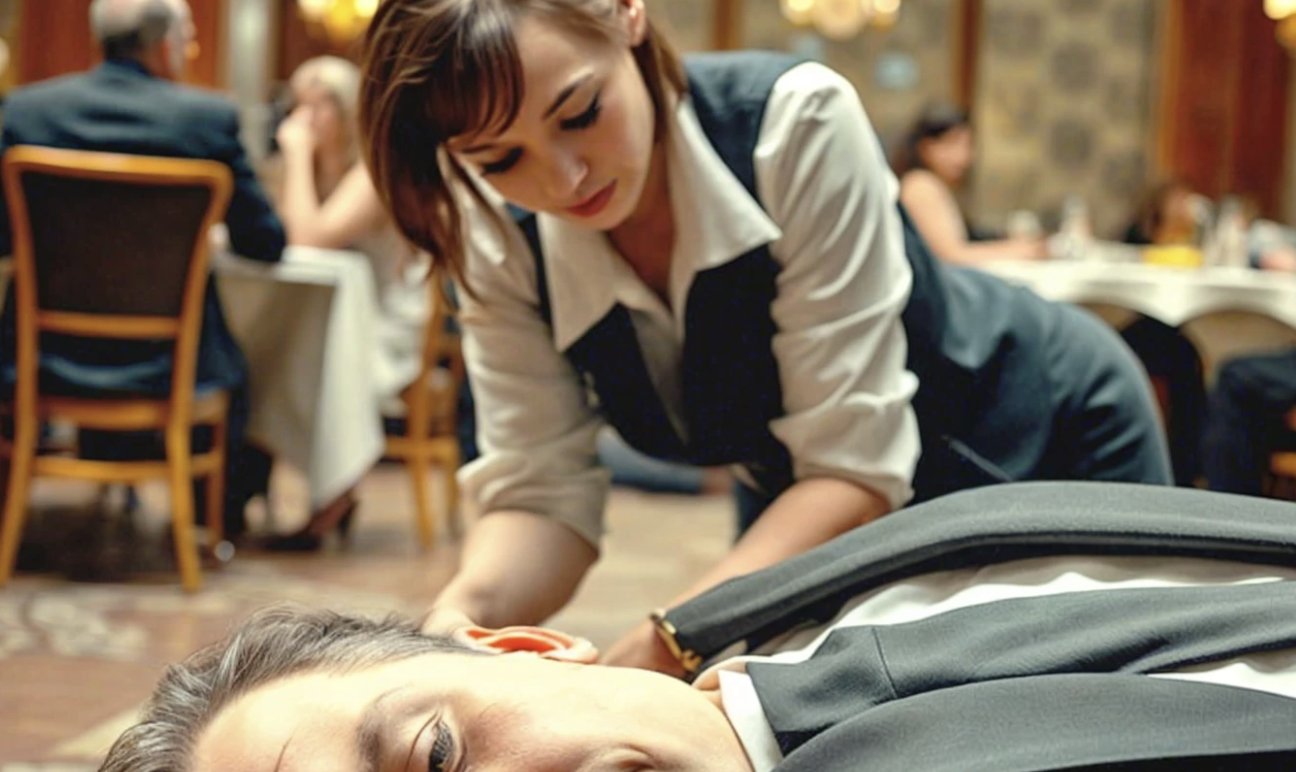Twenty-three-year-old Anastasia never knew her parents. She was found as an infant, wrapped in worn-out swaddling clothes, left right on the doorstep of an orphanage. This was told to her by her caregiver — Elena Viktorovna, a kind-hearted woman who genuinely cared for the children despite the harsh living conditions in the institution.
Within the orphanage walls grew various children — some withdrawn and hurt by life, others bold and quarrelsome. It was not easy to find friends among them. Little Nastya often remained alone: her peers were cruel, and the adults couldn’t always manage the tension that prevailed among the group of wards. Competition for the attention and love of the caregivers was fierce, which caused conflicts between children, sometimes even escalating into fights.
Elena Viktorovna tried to be fair, organized games, taught the children to cooperate and be considerate of each other. But her efforts did not always yield results. Still, for Anastasia, this woman became a close person, almost like a mother. After reaching adulthood, the young woman kept in touch with her caregiver, who continued to help her in adult life: helping with apartment paperwork, job searching, and supporting her in difficult moments.
Finding a job turned out to be difficult. Most employers doubted the girl who grew up outside the usual world. They feared she wouldn’t be able to adapt and had little understanding of modern realities. Only on her fifth attempt did Anastasia get lucky — she got a job as a waitress in a decent restaurant. Surprisingly, the job ad was found in a simple little newspaper that hardly anyone read. She didn’t know that the place was famous for a high turnover rate — hardly anyone lasted there more than a couple of weeks.
And so, the first day of work. The excitement of a new stage of life was replaced by warning signals. It turned out that the entire staff was under strict control of the manager — Anton, a man with the character of a despot. He demanded unconditional obedience, fined employees for any violation — whether a minute late or a carelessly tied tie. And most importantly — he confiscated tips that waiters received from customers, considering them “extra income.”
Anton kept the money in a special briefcase that he kept on his desk. He was extremely greedy but hid his passion for gambling. The tips taken from employees immediately went to the casino. At home, his wife awaited him, unaware of his addiction — otherwise, there would have been a scandal.
The manager was guided by the principle: “The customer is always right,” even if the customer was clearly out of his mind. He had no intention to protect employees — on the contrary, he encouraged client rudeness if it allowed him to humiliate the workers.
From colleagues, Anastasia learned the story of the previous waitress, whom Anton fired after a regular visitor — local deputy Knyazev — mocked her and then deliberately spilled juice on her in front of the whole hall. The girl couldn’t bear the humiliation and left. Anton, as usual, sided with the client.
But not everything in the restaurant was bad. In the kitchen worked a young man named Dmitry. He was twenty-five years old. He performed auxiliary duties — peeling vegetables, washing dishes, helping the chefs. Dmitry dreamed of becoming a real chef, had finished culinary college and additional courses, but Anton blocked his advancement, considering him too young and inexperienced.
“I know how to cook,” he told Anastasia, “but for him, age matters more than ability. His word is law. And if you want to work here, better keep quiet.”
Anastasia sympathized with him. She knew Dmitry lived with a sick mother and spent most of his modest salary on her treatment. The team treated the newcomer cautiously — she seemed too calm, patient, and unflappable. These qualities, formed by years of life in the orphanage, made her special. But they irritated Anton, who even argued with the head chef that the girl wouldn’t last a month.
One evening, Knyazev came to the restaurant — the very deputy famous for his antics. All the waitresses immediately lowered their heads, knowing what would begin. Anastasia was assigned to serve him — Anton’s order to test the “endurance” of the newcomer.
Knyazev, as usual, started to mock her:
“What a beauty! You’d be better off working somewhere else… Here they only collect tips, but you, it seems, could earn a lot more.”
Anastasia tried to keep a professional smile, answering coldly and politely, ignoring provocations. But the man wouldn’t stop — he questioned her about her past, ridiculed the menu, made her run back and forth, ordering the same thing several times. The girl held on, though she felt her strength running out.
In the kitchen, Dmitry paced anxiously:
“I’d knock his teeth out! How dare he treat her like that?!”
“Don’t get involved, Dim,” stopped him the head chef. “That won’t help. Look at her — see how she’s holding up? We haven’t had anyone like her for a long time. Maybe she’ll last.”
But suddenly the situation changed. Right at the table, Knyazev turned red, gasped for air, and collapsed to the floor. He convulsively gasped for air like a fish thrown ashore…
Anton froze in place. His face turned pale, his gaze darted between the fallen deputy and confused visitors. He didn’t know what to do — fear shackled him like chains. Panic rose in the hall: women screamed, men rushed about, someone ran for the exit. Only Anastasia remained calm.
Without hesitation, she knelt beside Knyazev. Quickly unbuttoned the tight collar of his shirt to ease his breathing, lifted his head so he wouldn’t choke, and immediately called an ambulance. The girl had no doubt — it was an allergic reaction. She had seen something like this before in the orphanage when a boy was stung by a wasp, and his life depended on immediate intervention. That incident was forever etched in her memory, teaching her to be ready for any twist of fate.
“If not for your help, we could have lost him,” said the doctor before taking the patient away. “You provided first aid correctly and timely. That is important.”
“Thank you…” Anastasia whispered, still not fully realizing what had happened.
Only now, when it was all over, did the girl understand how quickly and instinctively she had acted. Without thinking about consequences or whether the person deserved help, she just helped. But in the team, her act was perceived quite differently.
Anton, barely recovering from the experienced horror, exploded:
“Do you even realize what you did? This is a deputy! He will fire us all if something happens to him!”
“I did everything right!” Anastasia protested. “Do you want me just to stand and watch a man suffocate?”
“I don’t need such heroines! Trying to show off? Spent the whole evening hanging around him as if you knew what would happen! Maybe you slipped him something? This never happened before!”
“How can you say that?!” the girl couldn’t stand it. “I saved his life!”
But no one listened. For Anton, this was a personal blow. He lost control, showed his weakness, and Anastasia — the newcomer, unknown waitress — became the hero of the day. He could not forgive that.
“You’re no longer needed here. Get out before it’s too late!” he barked.
Even the colleagues just shrugged indifferently. They knew: you can’t go against Anton. He hated it when someone was better than him. Especially a woman. Especially a newcomer. Especially the one who saved a life instead of chickening out.
Anastasia returned home in tears. In one evening she experienced the full spectrum of human emotions — fear, compassion, anger, pain. She was accused of selfishness, carelessness, even a possible crime, although she only saved a person whom others were afraid to even judge aloud.
She cried, was angry, felt betrayed and lonely all day long. Then she pulled herself together and started looking for work. Money was running out, but she had to live somehow. She didn’t hope that Knyazev would ever call to thank her. He didn’t even make himself known.
But one afternoon, the doorbell rang.
A stranger of about forty stood at the door. He was modestly but expensively dressed. Confidence and respect could be read in his eyes.
“Hello, my name is Vladimir. My boss is opening a new restaurant and would like to offer you a job as a waitress.”
“Come in,” Anastasia replied, a bit confused.
Over a cup of tea, they discussed the details. It turned out that one of the visitors had recorded a video of her helping Knyazev. The clip went viral, gathering thousands of views and comments. People called her a true heroine, a role model. Now she was not just a waitress — she was famous.
“We need employees like you!” Vladimir said. “The conditions are good, the salary is decent. We’re forming a young team now; we need one more chef.”
“Oh, I know a great guy!” Anastasia lit up. “He’s long dreamed of becoming a chef but couldn’t break through.”
A few days later, Dmitry received the offer he had dreamed of for years. Now they worked together — in the new restaurant, under a new manager who values humanity, professionalism, and respect.
Knyazev was “demoted.” His behavior became public knowledge, and the authorities could not ignore such a scandal. Anton got what he deserved — the restaurant owners called him in for a talk where the staff openly voiced complaints. Under pressure from dissatisfaction, he was moved to the kitchen, to Dmitry’s old position, where he now peeled potatoes and washed dishes himself.
In the new team, Anastasia and Dmitry grew closer. Work, shared concerns, past hardships, and striving for a better future brought them together. They started dating, and the whole team warmly welcomed their relationship.
“Congratulations!” colleagues joked, ordering a cake. “Wedding soon?”
Vladimir did not just tolerate but supported the romance. For him, trust, respect, and harmony in the team mattered most. And if two people find each other in the process — so be it.


